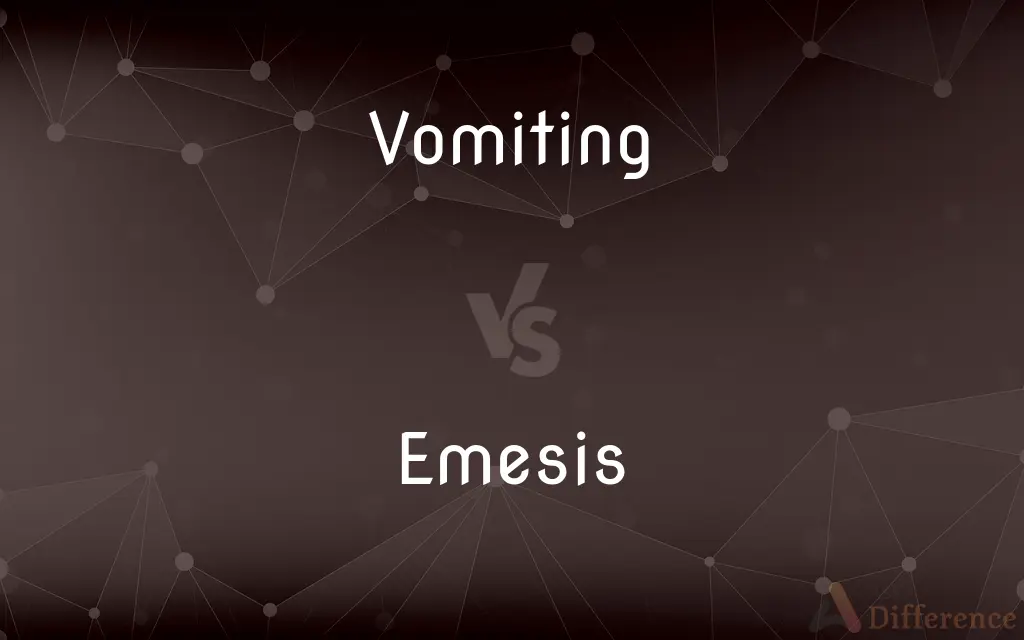Vomiting vs. Emesis — What's the Difference?
By Tayyaba Rehman & Maham Liaqat — Updated on March 12, 2024
Vomiting is the forceful expulsion of stomach contents through the mouth, while emesis is the medical term for vomiting.

Difference Between Vomiting and Emesis
Table of Contents
ADVERTISEMENT
Key Differences
Vomiting is a common term used in everyday language to describe the act of throwing up, emphasizing the physical experience. In contrast, emesis is used in clinical or medical contexts, focusing on the condition as a symptom or medical event.
While vomiting is understood broadly by the general public and can be described in various ways, emesis is often accompanied by medical terminology and used in healthcare documentation or discussions. On the other hand, emesis is described in a clinical context, often accompanied by details regarding causes, patterns, and implications for patient care.
Vomiting can be caused by a wide range of factors, including illness, food poisoning, and motion sickness, and is recognized by its symptoms and effects on the body. Whereas emesis is analyzed in the medical field to diagnose conditions, assess severity, and determine treatment, often involving detailed medical evaluation.
The treatment for vomiting may involve home remedies, over-the-counter medication, or rest, depending on its severity and cause. Conversely, the management of emesis may require medical intervention, prescription medications, and sometimes hospitalization, particularly if it is part of a broader medical issue.
Comparison Chart
Definition
Forceful expulsion of stomach contents through the mouth
Medical term for vomiting
ADVERTISEMENT
Context
Common, everyday language
Clinical, medical settings
Usage
Described in terms of symptoms and effects
Accompanied by medical terminology
Causes
Illness, food poisoning, motion sickness, etc.
Analyzed to diagnose conditions
Treatment
Home remedies, OTC medication, rest
Medical intervention, prescription medications, hospitalization
Compare with Definitions
Vomiting
Can be triggered by a range of factors, from food poisoning to stress.
The intense motion sickness led to vomiting.
Emesis
Emesis is used in healthcare settings to describe vomiting.
The patient reported emesis three times since morning.
Vomiting
Vomiting is widely understood and used in everyday conversation.
After feeling nauseous, she started vomiting.
Emesis
Described with precision in medical records.
The chart noted the frequency and volume of emesis.
Vomiting
Often treated with hydration and rest at home.
To ease the vomiting, he sipped on ginger ale.
Emesis
Considered a symptom that requires medical evaluation.
Persistent emesis warranted further investigation for underlying causes.
Vomiting
Emphasizes the physical act and sensation.
Vomiting was so forceful it caused him discomfort.
Emesis
May involve specific treatments based on diagnosis.
Antiemetic medications were prescribed to control the emesis.
Vomiting
Used generally without detailed medical analysis.
The child's vomiting subsided after a day of rest.
Emesis
Assessed in the context of overall health.
The doctor considered emesis in the diagnosis of gastroenteritis.
Vomiting
Vomiting (also known as puking, throwing up, barfing, emesis, among other names) is the involuntary, forceful expulsion of the contents of one's stomach through the mouth and sometimes the nose.Vomiting can be caused by many conditions; it may be present as a specific response to ailments like gastritis or poisoning, or as a non-specific sequela ranging from brain tumors and elevated intracranial pressure to overexposure to ionizing radiation. The feeling that one is about to vomit is called nausea; it often precedes, but does not always lead to vomiting.
Emesis
The act of vomiting.
Vomiting
To eject part or all of the contents of the stomach through the mouth, usually in a series of involuntary spasmic movements.
Emesis
(pathology) The act or process of vomiting.
Syrup of ipecac almost always forces an emesis.
Vomiting
To be discharged forcefully and abundantly; spew or gush
The dike burst, and the floodwaters vomited forth.
Emesis
A vomiting.
Vomiting
To eject (contents of the stomach) through the mouth.
Emesis
The reflex act of ejecting the contents of the stomach through the mouth
Vomiting
To eject or discharge in a gush; spew out
The volcano vomited lava and ash.
Vomiting
The act or an instance of ejecting matter from the stomach through the mouth.
Vomiting
Matter ejected from the stomach through the mouth.
Vomiting
An emetic.
Vomiting
Present participle of vomit
Vomiting
The act of one who vomits, or the matter that is vomited.
Vomiting
The spasmodic ejection of matter from the stomach through the mouth.
Vomiting
The reflex act of ejecting the contents of the stomach through the mouth
Common Curiosities
Can vomiting/emesis be a sign of a serious condition?
Yes, while it can be caused by minor issues, persistent or severe vomiting/emesis can indicate a more serious underlying condition and should be evaluated by a healthcare professional.
What does emesis mean?
Emesis is the medical term for vomiting, used in clinical and healthcare contexts to describe the same physical act.
What is vomiting?
Vomiting is the act of forcefully expelling stomach contents through the mouth, commonly referred to as "throwing up."
When should I use the term emesis instead of vomiting?
Use "emesis" in clinical or professional medical settings, and "vomiting" in everyday language or non-professional contexts.
Is it normal to experience vomiting/emesis with the flu?
Yes, vomiting/emesis can be a symptom of the flu, especially in children, but it's important to monitor for dehydration and consult a healthcare provider if necessary.
What home remedies can help with vomiting?
Home remedies for vomiting include staying hydrated, eating bland foods, and resting. Ginger or peppermint can also help soothe the stomach.
How is emesis treated in a medical setting?
Treatment for emesis in a medical setting can involve antiemetic medications, IV fluids for hydration, and addressing the underlying cause.
Can medications cause vomiting/emesis?
Yes, certain medications can have side effects that include vomiting/emesis. It's important to consult with a healthcare provider if this occurs.
Are vomiting and emesis the same thing?
Yes, vomiting and emesis refer to the same physical process, but the terms are used in different contexts.
When should I seek medical attention for vomiting/emesis?
Seek medical attention if vomiting/emesis is persistent, severe, accompanied by other serious symptoms, or if there's a risk of dehydration.
Share Your Discovery

Previous Comparison
Gat vs. Pistol
Next Comparison
Maxim vs. SloganAuthor Spotlight
Written by
Tayyaba RehmanTayyaba Rehman is a distinguished writer, currently serving as a primary contributor to askdifference.com. As a researcher in semantics and etymology, Tayyaba's passion for the complexity of languages and their distinctions has found a perfect home on the platform. Tayyaba delves into the intricacies of language, distinguishing between commonly confused words and phrases, thereby providing clarity for readers worldwide.
Co-written by
Maham Liaqat














































